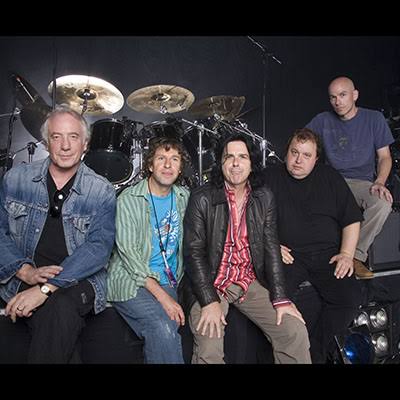The Final Note? Marillion’s Steve Hogarth Battles Throat Disease Amid Fears of Career-Ending Consequences

British neo-progressive rock band Marillion has weathered storms for over four decades—line-up changes, shifts in musical trends, and a fickle industry. But now, the band may be facing its most devastating challenge yet: Steve Hogarth, the band’s enigmatic and passionate frontman since 1989, is reportedly battling a serious throat condition that could bring an end to his career—and possibly, the band’s live future.
While details remain scarce and tightly controlled by the band’s inner circle, several sources close to the Marillion camp have hinted at a chronic vocal health issue that has been silently progressing over the past few years. Fans have noted sporadic cancellations, vocal inconsistencies during live shows, and a growing silence surrounding Hogarth’s health. If the rumors are true, Marillion may be teetering on the edge of a heartbreak not just for the band, but for millions of fans around the world.
A Voice That Redefined a Legacy
To understand the magnitude of this crisis, one must appreciate what Steve Hogarth represents to Marillion and to progressive rock as a whole. When he replaced the charismatic Fish in 1989, many fans believed the band would collapse. Instead, Hogarth ushered in a new era of deeply emotional, experimental, and introspective music. Albums like Seasons End, Brave, and Afraid of Sunlight showcased his haunting falsetto and lyrical vulnerability—traits that became the band’s signature for a generation of listeners.
But what happens when that voice begins to fail?
Reports from the recent An Hour Before It’s Dark tour noted Hogarth struggling to reach higher registers. While most assumed it was age or exhaustion, an anonymous source from the tour team claims that Hogarth has been quietly managing a “persistent and degenerative condition affecting his vocal cords.” According to this insider, doctors have warned that continued strain could result in permanent damage, forcing a complete halt to touring and potentially even recording.
Public Silence, Private Panic?
In an era where celebrities broadcast their health issues for sympathy or awareness, Hogarth and Marillion have taken a different route. Despite the growing concerns among fans and a noticeable change in his vocal delivery, the band has not issued any formal statement.
Is this noble stoicism—or a PR gamble?
Some critics argue that keeping fans in the dark betrays the transparency and intimacy that Marillion has always prided itself on. The band’s unique relationship with its supporters, especially through crowdfunding and direct communication, sets it apart. So why the secrecy?
“Fans have funded albums and tours, invested emotionally and financially,” says Peter Jameson, a longtime follower and former editor of The Web (a Marillion fan magazine). “We deserve honesty. If Steve is seriously ill, we need to prepare ourselves emotionally. Keeping it secret feels like a betrayal of the trust we’ve built over decades.”
But defenders of the band see it differently. “Steve has always been a private man. If he wants to fight this battle quietly, we owe him that respect,” counters Sarah Dubois, a fan who’s seen the band over 40 times. “His voice is his soul—of course he’s scared.”
A Career in the Balance
If Hogarth’s condition worsens, the implications are catastrophic—not just for Marillion, but for a specific subculture of rock fans who consider the band a cornerstone of their identity. The group isn’t just a musical act; it’s a movement.
But would Marillion even continue without Hogarth?
Steve Rothery, the band’s lead guitarist and co-founder, has previously admitted that he can’t envision Marillion with another lead vocalist again. “We’ve evolved together. It’s not just about voice—it’s about chemistry, about spirit,” Rothery once said in a 2019 interview. That sentiment now feels eerily prophetic.
Unlike in the 1980s, when Fish’s departure was seen as a new chapter, Hogarth’s potential exit would feel like a final curtain. For over 35 years, he hasn’t just been a singer—he’s been the emotional pulse of the band, the vulnerable conduit through which songs like “Easter,” “The Great Escape,” and “The Invisible Man” have reached into listeners’ souls.
Replacing him, even temporarily, would be almost sacrilegious for many fans.
The Unspoken Tragedy of Aging Rock Icons
Steve Hogarth’s plight underscores a broader, uncomfortable truth: rock icons are aging, and so are their voices.
Paul Stanley of KISS now lip-syncs parts of his performances. Jon Anderson of Yes has admitted to vocal strain. Even Bruce Dickinson of Iron Maiden, who beat cancer, now sings with more restraint. Vocal cords, unlike instruments, can’t be repaired or replaced easily. They age, they scar, and they break.
But few fans want to acknowledge this reality.
In the age of perfect Auto-Tune and studio polish, live performance remains the last bastion of authenticity. But when the voice falters, do we accept the decline or demand the impossible?
“Fans want the magic,” says music journalist Helen Parrington. “But the magic comes at a cost. For singers like Hogarth, who put every ounce of emotion into every syllable, the cost is often irreversible damage.”
What’s Next? Silence or Survival?
There are whispers that Hogarth is exploring vocal therapy, rest periods, and even alternative recording techniques to preserve his voice. Some say the band is experimenting with instrumental versions of future material or featuring guest vocalists. But those are band-aids on a deeper wound.
If the condition is indeed as serious as insiders suggest, Hogarth may soon have to choose between risking total loss of voice or stepping back permanently.
This moment could mark the end of Marillion as we know it—or the beginning of a painful but necessary reinvention.
Either way, fans deserve to be part of that journey, not shielded from it.
Conclusion: A Bittersweet Legacy
If this truly is the twilight of Steve Hogarth’s singing career, then let it be acknowledged with the gravity it deserves.
He is not just a vocalist—he is a storyteller, a poet, a vessel for emotion that has carried Marillion and its fans through decades of musical evolution. If silence is to follow, let it be a silence filled with gratitude, not confusion. Let fans know what they’re grieving—not just the decline of a voice, but the fading of an era.
Marillion may survive as a band, but without Steve Hogarth’s voice, it will never sound the same.
And maybe, just maybe, that’s the point.









